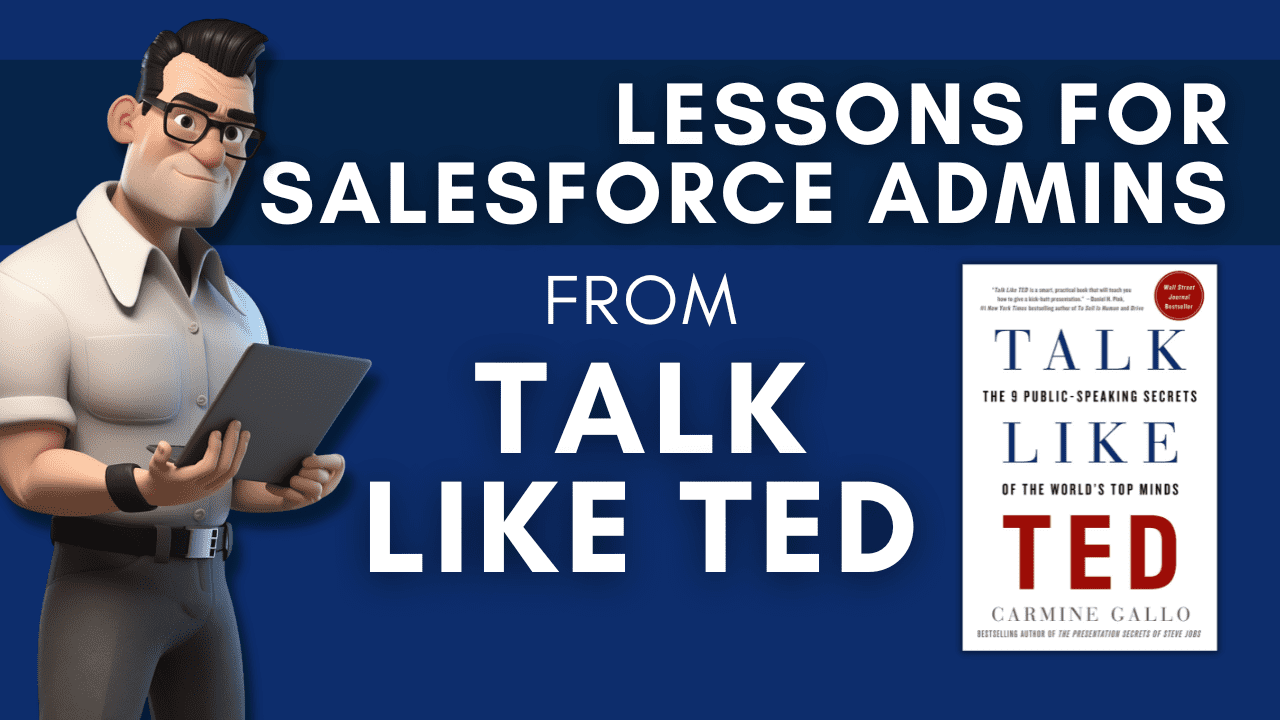The Power of Storytelling: Lessons for Salesforce Admins from Talk Like TED

Introduction
As a Salesforce Admin, you are responsible for managing complex projects that involve multiple stakeholders and teams. Effective communication is essential for successful project outcomes, and one of the most powerful tools you can use is storytelling.
The book Talk Like TED: The 9 Public-Speaking Secrets of the World’s Top Minds comes into play here. This book explores the techniques used by successful TED speakers to deliver engaging and impactful presentations. While the book primarily focuses on public speaking, its lessons equally apply to project management and communication in a corporate environment.
In this article, we’ll explore how the power of storytelling can benefit Salesforce admins and how the lessons from Talk Like TED can help you improve your communication and project management abilities. By the end of this article, you’ll better understand the science of storytelling and practical tips for using stories to drive results in your Salesforce projects.
So, let’s get started!
The Science of Storytelling
As a Salesforce Admin, you may think your job is managing projects, data, and systems. While that’s certainly a big part of it, effective communication is just as important. And one of the most powerful ways to communicate is through storytelling.
Why Storytelling Matters
Storytelling has been a fundamental part of human communication for thousands of years. From ancient myths and legends to modern-day movies and TV shows, stories can captivate, inspire, and move us profoundly.
But why is that?
The Psychological Impact of Stories
According to research, stories activate different parts of our brain compared to regular communication. When we hear a story, our brains release oxytocin, which helps us feel empathy and connect with others. Stories also engage the parts of our brain responsible for sensory processing, making them more memorable than abstract concepts or data.
The Emotional Impact of Stories
Stories can also have a powerful emotional impact on us. When we hear a story, we can experience the same emotions as the characters, even if they’re fictional. This emotional resonance helps us remember the story and the message it conveys.
How Storytelling Applies to Project Management
Now, you may be wondering how storytelling applies to project management. After all, you’re not trying to entertain your stakeholders or customers – you’re trying to get work done. But storytelling can be incredibly compelling for communicating with others and driving action.
Connecting With Your Audience
In project management, connecting with your audience – your team, stakeholders, or customers- is essential. And storytelling can help you do that. By telling a story that resonates with your audience, you can create a shared experience and build trust.
Using Emotion to Drive Action
Another way storytelling can help in project management is by using emotion to drive action. Data and logic alone may not be enough to get people to buy into a project or take action. But if you can tell a story that appeals to their emotions, you may be able to inspire them to take action.
In conclusion, storytelling is a powerful tool to help Salesforce admins communicate more effectively and drive action in their projects. By understanding the science behind storytelling and applying the lessons from Talk Like TED, you can become a more effective communicator and achieve better results in your work.
SNAG THESE FREE RESOURCES!

Struggling to Manage Your Salesforce Projects?
Master Project Management With Our Expert Resources for Salesforce Admins.
Check out some of these FREE RESOURCES, templates, ebooks, and courses to take your project management skills to the next level and take control of your Salesforce career!
The 9 Public-Speaking Secrets of the World’s Top Minds
One of the key takeaways from the book “Talk Like TED” is the nine public-speaking secrets that have helped some of the world’s most successful speakers deliver impactful and engaging presentations.
Here’s an overview of these secrets and how they can be applied to storytelling in project management:
1. Unleash the Power of Emotion
- Use stories and anecdotes that evoke emotions to connect with your audience.
- In project management, use emotional appeals to persuade stakeholders and drive action.
2. Tell a Story
- Stories help make complex ideas more relatable and understandable.
- Use storytelling in project management to convey the why behind a project and create a sense of purpose.
3. Have a Conversation
- Engage with your audience and make them feel like part of the conversation.
- In project management, communicate with stakeholders to encourage a two-way dialogue.
4. Teach Something New
- Share insights and information that your audience is not familiar with.
- In project management, use data and analytics to provide stakeholders with new insights and perspectives.
5. Deliver Jaw-Dropping Moments
- Create moments of surprise and awe to keep your audience engaged.
- In project management, use innovative approaches to deliver unexpected results.
6. Use Humor
- Humor can make your presentation more memorable and enjoyable.
- In project management, use humor to break down barriers and build stakeholder relationships.
7. Stick to the 18-Minute Rule
- Keep your presentations concise and to the point.
- In project management, use concise and clear communication to avoid confusion and keep stakeholders on track.
8. Paint a Mental Picture With Multisensory Experiences
- Use visual aids, props, and other sensory experiences to make your presentation more engaging.
- In project management, use visual aids to communicate complex concepts and data.
9. Stay In Your Lane
- Stick to what you know and are passionate about.
- Focus on your strengths and expertise in project management to deliver successful projects.
By applying these public-speaking secrets to storytelling in project management, Salesforce Admins can improve their communication and project management abilities and deliver more successful projects.
Crafting Compelling Stories for Salesforce Projects
To succeed in project management, Salesforce Admins must communicate their vision and goals effectively to their team and stakeholders.
One of the most potent ways to do this is through storytelling.
Here are some practical tips for crafting compelling stories in Salesforce projects:
Connect With Your Audience
The key to a successful story is connecting with your audience. You need to understand what motivates them, what challenges they face, and what their goals are. Once you understand this, you can tailor your story to resonate with their needs and interests.
Use Emotion to Drive Action
Emotion is a powerful tool for driving action. When people feel emotionally connected to a story, they are more likely to remember it and take action based on it.
When crafting your story, focus on the emotions you want to evoke in your audience. Do you want them to feel inspired? Motivated? Empathetic?
Once you’ve identified the emotions you want to convey, find ways to weave them into your story.
Keep It Simple
The best stories are often the simplest ones. Avoid getting bogged down in details or technical jargon that might confuse your audience.
Instead, focus on telling a story that is easy to understand and communicates your key message.
Use Visuals to Enhance Your Story
Visuals can be a powerful tool for enhancing your story. Whether it’s a graph, a chart, or a picture, a well-placed visual can help to convey your message more engagingly and memorably.
When using visuals, make sure they are relevant to your story and that they enhance rather than detract from your message.
Practice, Practice, Practice
Crafting a compelling story takes time and practice. Don’t be afraid to experiment with different approaches and techniques until you find what works best.
Practice your story with colleagues or friends to get feedback and refine your delivery. The more you practice, the more confident and effective you will become.
These tips can create compelling stories to engage and motivate your team and stakeholders. Remember, storytelling is a powerful tool for project management, and mastering this skill will help you achieve your goals and drive results.
Using Stories to Drive Results
As a Salesforce admin, you have a lot of responsibilities. You’re in charge of managing projects, communicating with stakeholders, and ensuring that everything runs smoothly.
But have you ever considered using storytelling as a tool to achieve your project goals?
The Power of Storytelling
Storytelling is a powerful way to connect with people, evoke emotions, and drive action.
When you tell a story, you’re not just sharing information – creating a memorable experience that engages your audience and inspires them to take action.
As a Salesforce admin, you can use storytelling to help stakeholders understand the impact of your projects, gain buy-in for new initiatives, and drive the adoption of new tools and processes.
Real-World Examples
Here are some real-world examples of successful storytelling in Salesforce projects:
- Example 1: The “Why” Behind the Change: When rolling out a new tool or process, it’s important to help stakeholders understand why the change is necessary. One Salesforce admin used storytelling to illustrate the pain points of the old system and the benefits of the new one. By sharing a story of a frustrated sales rep who struggled to find the information they needed, the admin generated buy-in and enthusiasm for the new tool.
- Example 2: The Success Story: When you’ve completed a project, don’t just share the facts and figures – share a story of how the project impacted the organization. One Salesforce admin used storytelling to share a success story about how a new tool helped a sales team close more deals. By sharing the story of a sales rep who struggled to close a deal before the tool was implemented, the admin could show the project’s impact and inspire others to adopt the tool.
- Example 3: The Vision Story: When embarking on a new project, it’s important to help stakeholders understand the vision and the end goal. One Salesforce admin used storytelling to share a vision of how a new tool would transform the organization. By painting a picture of a future state where everyone was using the tool and experiencing increased productivity, the admin generated excitement and commitment to the project.
Storytelling in your project management toolkit can help you achieve your goals and drive results.
By connecting with your audience emotionally and painting a vivid picture of the impact of your projects, you can generate buy-in, enthusiasm, and commitment.
So the next time you communicate with stakeholders, consider using storytelling to drive your message home.
Conclusion
In conclusion, compelling storytelling is a crucial skill for Salesforce admins, and the lessons from Talk Like TED can help them improve their communication and project management abilities. Here’s a quick recap of what we’ve learned:
- Storytelling is a powerful tool for communication and project management.
- The nine public-speaking secrets from Talk Like TED can be applied to storytelling in project management.
- Crafting compelling stories is essential for successful Salesforce projects.
- Using stories can help drive results and achieve project goals.
Mastering the art of storytelling can make a significant difference in the success of your Salesforce projects.
By connecting with your audience, using emotion to drive action, and applying the lessons from Talk Like TED, you can become a better storyteller and a more effective Salesforce admin.
So, don’t be afraid to use stories to bring your Salesforce projects to life. Whether presenting to stakeholders, leading a team, or communicating with clients, storytelling can help you engage and inspire your audience.
As you apply the lessons from Talk Like TED to your work, you’ll be amazed at its impact on your communication and project management abilities.
Thank you for reading this article; we hope it has been helpful and insightful.
Happy storytelling!
Disclosure: Some of the links in this article may be affiliate links, which can compensate Brainiate LLC at no cost to you if you decide to make any purchase. These are products we’ve personally used and stand behind. This site is not intended to provide financial advice and is for entertainment only. You can read our affiliate disclosure in our privacy policy.
